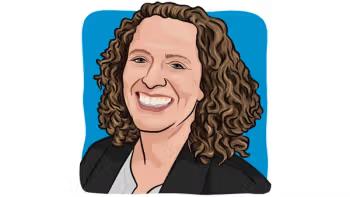
- Lung Cancer Special Issue 2023
Patients With Lung Cancer Face Unmet Needs During Drug Shortages
Dr. Gene G. Finley spoke about current patient treatment obstacles as part of CURE’s ‘Speaking Out’ video series.
Gene G. Finley, assistant professor at Drexel University’s College of Medicine in Philadelphia and medical oncologist at Allegheny Health Network (AHN) Cancer Institute, Allegheny Clinic Medical Oncology in Monaca, Pennsylvania, has his eyes on the future.
Finley, who spoke with CURE as part of its “Speaking Out” video series, discussed unmet needs regarding treatment options for patients with non-small cell lung cancer, such as a broader range of drugs to modulate T-cell function and ways that patients’ own T cells can be engineered to fight cancer — a therapeutic tactic already shown to be effective for patients with blood cancers.
With the platinum-based chemo- therapy shortage still on patients’ and providers’ minds, Finley also discussed how the shortage has impacted the treatment of patients with lung cancer.
Q: What are some unmet needs regarding treatment and advances that are hoped for the future?
A: I think that there are a number of threads going on. Now one thing to bear in mind is although we have some very effective reagents, they are only interacting with two pathways that occur on the T cell, and there are literally more than two dozen pathways that regulate T-cell function. One of the areas of drug development is looking at different molecules that can help or inhibit the function of those T cells, both for the treatment of cancer and perhaps other autoimmune diseases. That’s one broad swath of how things are moving forward.
I think the other major area of interest is in cellular immunotherapy.
There’s been a lot of work done demonstrating that if you can engineer a T cell to fight cancer by genetically modify- ing your own T cells, that’s a very good strategy and it’s been highly effective in leukemias and lymphomas, the so-called liquid tumors. It hasn’t really made the jump to solid tumors, such as lung cancer, but this is a work in progress, and we are conducting a clinical trial in lung cancer using lymphocytes (a type of white blood cell), not derivatized lymphocytes, but lymphocytes derived from tumor cells. And that strategy seems to be a good avenue.
I would say those are the two things: better drugs to modulate T-cell function and engineering T cells to fight cancer directly. Obviously, there are a lot of other threads out there that are important as well.
Q: What impact has the chemotherapy drug shortage had on patients with non-small cell lung cancer?
A: Well, we’ve been pretty successful at AHN in anticipating these drug shortages. One of the key shortages (has been) of a drug called cisplatin, that’s been a common one.
(For) that drug, there are other medicines that work similarly — for example, a drug called carboplatin. We tend to use more carboplatin than cisplatin because cisplatin is harder to tolerate. It causes more nausea and vomiting than carboplatin, and it causes more kidney damage than carboplatin.
Many of our lung cancer patients (are older), they’re already infirm, so we like to use drugs that are more tolerable so that we can actually get the treatments into the patient. For most lung cancer patients — remember that two-thirds of lung cancer patients present in an advanced stage that traditionally has not been felt to be curable — in that setting, that’s where we use the bulk of these platinum-based chemotherapies.
In patients who have had an early stage, say a stage 1 or stage 2 lung cancer, the mainstay of therapy is surgery. That’s where we often would use cisplatin chemotherapy, as a prevention or as an adjunct ... after the surgical treatment. That strategy has also been pretty effective. And that’s where the drug shortage of cisplatin has been most difficult for us, not in the majority of patients who present with advanced disease.
This transcript has been edited for length and clarity.
For more news on cancer updates, research and education, don’t forget to
Articles in this issue
over 2 years ago
On the Front Lines With Veterans Facing Lung Cancerover 2 years ago
On the Front Lines of Lung Cancerover 2 years ago
Lowering Doses to Increase Quality of Life in Lung Cancer



